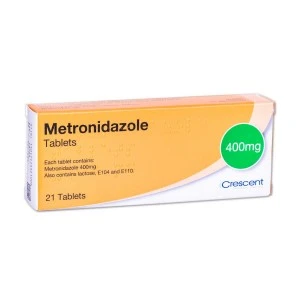Metronidazole and Alcohol: Can You Drink on Metronidazole?
Table of contents:
- Can You Drink Alcohol with Metronidazole?
- Why Can’t You Drink on Metronidazole?
- What Happens If You Drink Alcohol with Metronidazole?
- How Long After Taking Metronidazole Can I Drink Alcohol?
- Metronidazole and Alcohol: Key Takeaways
- Frequently Asked Questions About Metronidazole and Alcohol
- Buy Bacterial Vaginosis Treatments Safely & Securely
Metronidazole is a commonly prescribed antibiotic used to treat various infections, including bacterial vaginosis. It works by disrupting the bacteria’s ability to produce proteins, which leads to the loss of their DNA, ultimately killing them and eliminating the infection from the body. Metronidazole is available as oral tablets, vaginal cream, or gel, and it is 65% to 90% effective.
Some common questions regarding the medication include “Can you drink on Metronidazole?” and what will happen if you mix Metronidazole and alcohol together. If this subject is something you’ve been wondering about, look no further, as we have all the answers.
Can You Drink Alcohol with Metronidazole?
No, you should avoid drinking alcohol while taking Metronidazole until at least 2 days after your antibiotic course has finished. That’s because mixing the two can cause a disulfram-like reaction (DLR), which happens when you mix certain medications with alcohol. It leads to a buildup of the toxic metabolite, acetaldehyde, and can cause severe symptoms, including being sick, stomach pain, and headaches.
It is important that you avoid all types of alcohol, both in food and drink, when taking Metronidazole to treat bacterial vaginosis (or any other condition). Doing so will reduce the chance of potentially debilitating side effects.
Why Can’t You Drink on Metronidazole?
According to sources, the combination of Metronidazole and alcohol can cause a reaction similar to disulfiram, leading to symptoms like nausea, vomiting, and stomach cramps. This happens because metronidazole interferes with how your body breaks down (metabolises) alcohol, causing a build-up of acetaldehyde, a toxic by-product of alcohol metabolism.
Despite the common warning, some studies have shown that the combination does not necessarily cause problems. The reaction may not occur in everyone, and the concern might be overstated. One study involving 12 healthy male volunteers found that Metronidazole did not increase acetylaldehyde or produce any adverse effects when taken with alcohol.
On the other hand, a review of six case reports involving eight patients found that 50% of cases reported serious effects when Metronidazole and alcohol were mixed, including one death. However, there was no conclusive evidence that these were caused by a metronidazole-ethanol reaction.
There is a need for further research to understand this potential interaction, particularly to identify the susceptible subgroup of people. Until more is known, it is advised to err on the side of caution and avoid alcohol while taking Metronidazole.

What Happens If You Drink Alcohol with Metronidazole?
Drinking alcohol with Metronidazole can cause very unpleasant side effects because the combination of Metronidazole and alcohol can cause a reaction in some people. Although the reaction, often referred to as a disulfiram-like reaction, may not occur in everyone, the side effects can be severe and make you feel quite unwell. They may include:
- Feeling and being sick
- Stomach pain
- Hot flushes
- A fast or irregular heartbeat
- Headaches
- Feeling dizzy
- Feeling drowsy
Even if these effects do not occur in you, drinking alcohol at the same time as taking metronidazole can lengthen the time it takes for the infection to go away. Alcohol naturally disrupts your body’s ability to recover from illness and even reduces the effectiveness of Metronidazole, meaning you may need a longer course of antibiotics and feel unwell for longer.
How Long After Taking Metronidazole Can I Drink Alcohol?
Ideally, you should not drink alcohol for 2 days after you have stopped taking Metronidazole. The half-life of Metronidazole, that is, the time it takes for half of the medication to leave your body, is eight hours, but it can take up to 44 hours for it to completely leave your system.
So, waiting at least 48 hours before drinking alcohol ensures that it has fully left your body and there is no chance of experiencing a reaction. If you have liver issues, it may take a little longer for your liver to metabolise Metronidazole, meaning it may take longer than 48 hours for it to be completely cleared. In this instance, you should speak to your clinician, who may advise that you wait 72 hours or 3 days before drinking alcohol again.

Metronidazole and Alcohol: Key Takeaways
The general advice remains to avoid alcohol while taking Metronidazole, mainly due to the potential unpleasant side effects and the lack of clarity on the exact interaction between the two substances. However, the controversy surrounding this topic highlights the need for further research to understand the true nature of this interaction. Until then, it is wise to follow medical guidelines and abstain from alcohol when prescribed Metronidazole, especially if it is being used to treat conditions like bacterial vaginosis.
Frequently Asked Questions About Metronidazole and Alcohol
If you’ve been prescribed Metronidazole for bacterial vaginosis or any other infection, it’s likely you’ll have questions about how safe it is to drink alcohol while you’re taking it. Here, we address some of the most frequently asked questions to help you maximise the benefits of your treatment.
I Accidentally Drank Alcohol While Taking Metronidazole. What Should I Do?
If you have accidentally drunk some alcohol while taking Metronidazole, stop drinking as soon as you realise. It may be helpful to drink some water and have someone stay with you in case you experience any adverse effects. You should then monitor how you are feeling and look out for signs of an adverse reaction.
If you experience any of the following symptoms — nausea, vomiting, headaches, a rapid heartbeat, or drowsiness — or any other unusual symptoms, you should seek urgent medical attention.
Can I Drink Alcohol 12 Hours After Taking Metronidazole?
No, it is important that you wait 48 hours before you drink alcohol after finishing a course of Metronidazole. You should avoid alcohol completely while you are taking it to prevent any complications or severe side effects that may require urgent medical attention.
The reason you should wait 48 hours is that it can take this long for Metronidazole to completely leave your body. After 48 hours, it should be safe to drink alcohol without the risk of any interaction with the antibiotic.
Metronidazole
- A first-line antibiotic recommended by the NHS
- Decades of clinical success
- Simple and convenient to use
Can I Drink Alcohol 24 Hours Before Taking Metronidazole?
No, guidelines state that you must wait 48 hours after finishing Metronidazole before drinking alcohol or 72 hours if you have liver issues. Although not everyone may get a severe reaction, waiting 48 hours means you can safely drink without the risk of a disulfiram-like reaction.
If you drink before 48 hours have passed, you may get severe side effects like feeling or being sick, an irregular or fast heartbeat, drowsiness, stomach pain, or hot flushes. If you experience any of these symptoms, seek urgent medical attention.
Does Alcohol Stop Metronidazole from Working?
Alcohol may not directly stop Metronidazole from working, but it can weaken the immune system, which may lengthen your recovery time. Alcohol can also change your vaginal microbiome, making you more susceptible to bacterial vaginosis or worsening your symptoms. Therefore, you should avoid alcohol throughout your course of antibiotics and for two days after.
Buy Bacterial Vaginosis Treatments Safely & Securely
Bacterial vaginosis is a common condition, and it’s natural to feel a little embarrassed about your symptoms, but you needn’t let this put you off seeking help. At Prescription Doctor, we offer fast, effective, and safe treatments to help clear the infection and enable you to return to your everyday life.
There’s no need for a face-to-face appointment; just complete a short online consultation so that our clinician can determine if the treatment is safe and suitable for you. If it is, we’ll post your medication discreetly in plain, unmarked packaging to your home address. It’s as simple as that. Orders approved before 3pm on a weekday are also eligible for next-day delivery.
Our GPhC-registered pharmacy has been helping people just like you take control of their health since 2013, and is trusted by thousands of UK customers.
Need fast bacterial vaginosis relief? Start your consultation today.
Sources
- AJOG (2021). Bacterial vaginosis and its association with infertility, endometritis, and pelvic inflammatory disease.
- Drugs.com (2025): What happens if you drink alcohol with metronidazole?
- JPPT (2019). Disulfiram-like Reaction With Metronidazole: An Unsuspected Culprit.
- NHS: Antibiotics Interactions.
- PubMed (2002). Lack of disulfiram-like reaction with metronidazole and ethanol.
- PubMed (2000). Do ethanol and metronidazole interact to produce a disulfiram-like reaction?
Authored By

Leanne Edermaniger
Medical Content WriterPublished on: 11/08/2023 Re-Published on: 17/09/2025
Reviewed By

Mohamed Imran Lakhi
MPharm - Lead PharmacistReviewed on: 17/09/2025
© 2013 - 2026 Al Muhsineen Limited. All Rights Reserved. Registered Pharmacy: 34 Halliwell Road, Bolton BL1 8RL. Registered Office: 254 First Floor, Shearbrow, Blackburn, England, BB1 8DS






